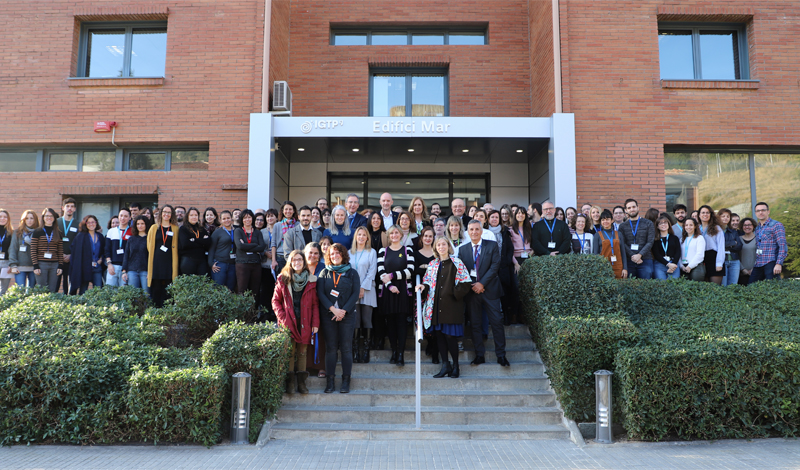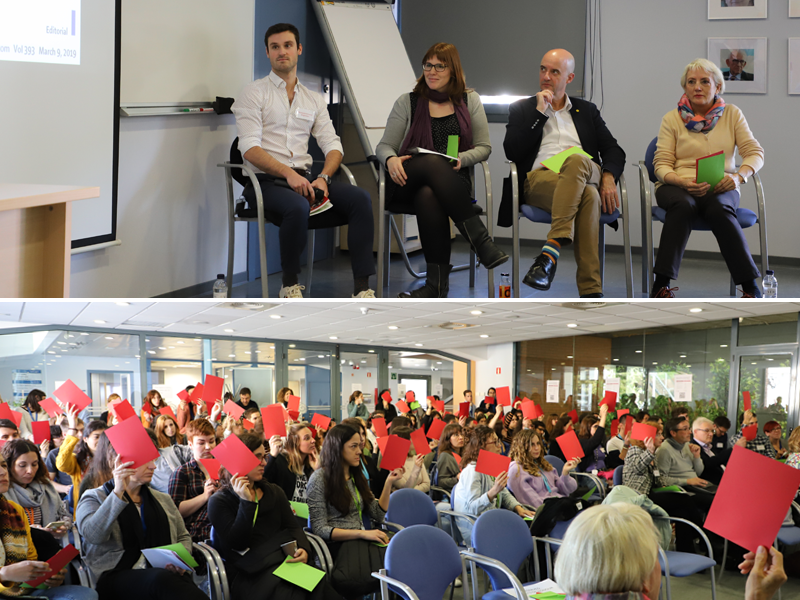The Second Can Ruti Campus Symposium on Integrating the Gender Perspective in Biomedical Research stresses the need for equality

The organizers proclaimed themselves very pleased with the reception that the symposium has had this year. The Minister of Health for the Government of Catalonia, the Honourable Ms Alba Vergés i Bosch gave the inaugural speech and stated that promotion and reinforcement of gender equality in biomedical research was an important objective for the government. She thanked all those in positions of authority who were also demonstrating their belief in the need for changes and professed herself to be very optimistic as the 19 research centres depending on the Ministry of Health, including the IGTP, have all signed the document committing them to promote change.

Dr Núria Radó, Researcher at the Agència de Qualitat i Avaluació Sanitàries de Catalunya (AQuAS) presented data on the situation in Catalonia and Spain. Unfortunately, both are near the bottom of the European table both in terms of women on the staff and salaries for women. AQuAS has found the situation follows the well-known four steps of the vicious circle of gender bias: most women are in lower positions, their performance is lower and they have a lower scholarly performance and impact. Much fewer women than men lead high impact publications, although one bright spot is that where they do lead, they obtain the same quality indicators as men.
For the Working Group Women in Science Dr Julia Garcia Prado, Scientific Director at the IGTP, explained advances made at the IGTP over the last year. These include joining the Community of Practice (CoP) LifeSciCop, which is part of the European Project ACTon Gender, coordinated from the Open University of Catalonia with the objective of helping research centres implement equality plans. Being a member of the CoP has allowed the IGTP to access the questionnaire, prepared by the experts on the ACTonGender team, which is the first step in implementing the new Equality Plan for the institute. The IGTP will administer the questionnaire in March this year.
Dr Garcia Prado also highlighted the fact that thanks to the influence of the WiS the organizers of the Talents Grants had named their first female mentor in 2019 and closed the awards event with a round table on Women in Science. Another positive action had been for the Can Ruti Campus Seminar Series to change their guidelines and aim for a minimum of 40% women speakers and hosts, achieving 50:50 for the 2020 programme. She reiterated the need for gender equality to be sought not in isolation, but in the context of the principals of Responsible Research and Innovation (RRI). The WiS is committed to working on SMART goals (Specific, Measurable, Achievable, Realistic and Timely) and to providing structure to the advance towards institutional change.
For his part, Dr José A. Muñoz-Moreno outlined some more of the activities of the WiS. These include the first WiS Symposium last year; the signing of a letter of intentions, first by 6 directors of institutions on the campus and also by over 100 researchers. Also a training session given by Dr Maria Garcia-Parajo on Positive actions to empower Women in Science: the two sides of the coin, where she shared best practices from the Catalan Institute of Photonics (ICFO). He also explained how the Wis Observatory had analysed speakers at events on the campus and highlighted seven "winners" with more than 40% women speakers. In 2020 the WiS will be more proactive still and provide feedback to organizers on their gender equity performance.
Sex and gender perspectives in biomedical research
Dr Pere-Joan Cardona, Leader of the Experimental Tuberculosis Unit at the IGTP and Director of the Centre for Comparative Medicine and Bioimaging (CMCiB-IGTP) gave a journal club citing many examples of problems with research in which sex had not been taken into account as a variable.

Dr Núria Izquierdo-Useros and Dr Marta Monguió-Tortajada moderated a round table session on taking sex into account in biomedical research with Dr Radó from ACuAS, Dr Pere-Joan Cardona, Prof Patri Vergara, of the Faculty of Veterinary Medicine of the Universitat Autònoma de Barcelona and Dr Oriol Iborra, researcher in the Heart Disease Research Group at the IGTP. Discussion ranged from different responses to treatments by males and female, treatments that are tested in males, but applied to females and the underdiagnosis of diseases such as heart disease or osteoporosis in one of the sexes. There also followed debate around how taking sex into account does not necessarily mean doubling sample size or compromising the principals of the 3Rs in animal research.
In her summing up, Dr Cristina Agustí thanked everybody for taking part and gave a round-up of the main conclusions. She highlighted the fact that with the Ministry of Health in Catalonia, the Instituto Carlos III of the Spanish Government, the European and national funding bodies and many of the top journals all making the consideration of sex and gender requisites for biomedical research the Can Ruti Working Group Women in Science is right on point in pushing for changes at all levels for what has been demonstrated to provide benefits for the whole community.
Sign the letter of declaration of intentions on gender balance
